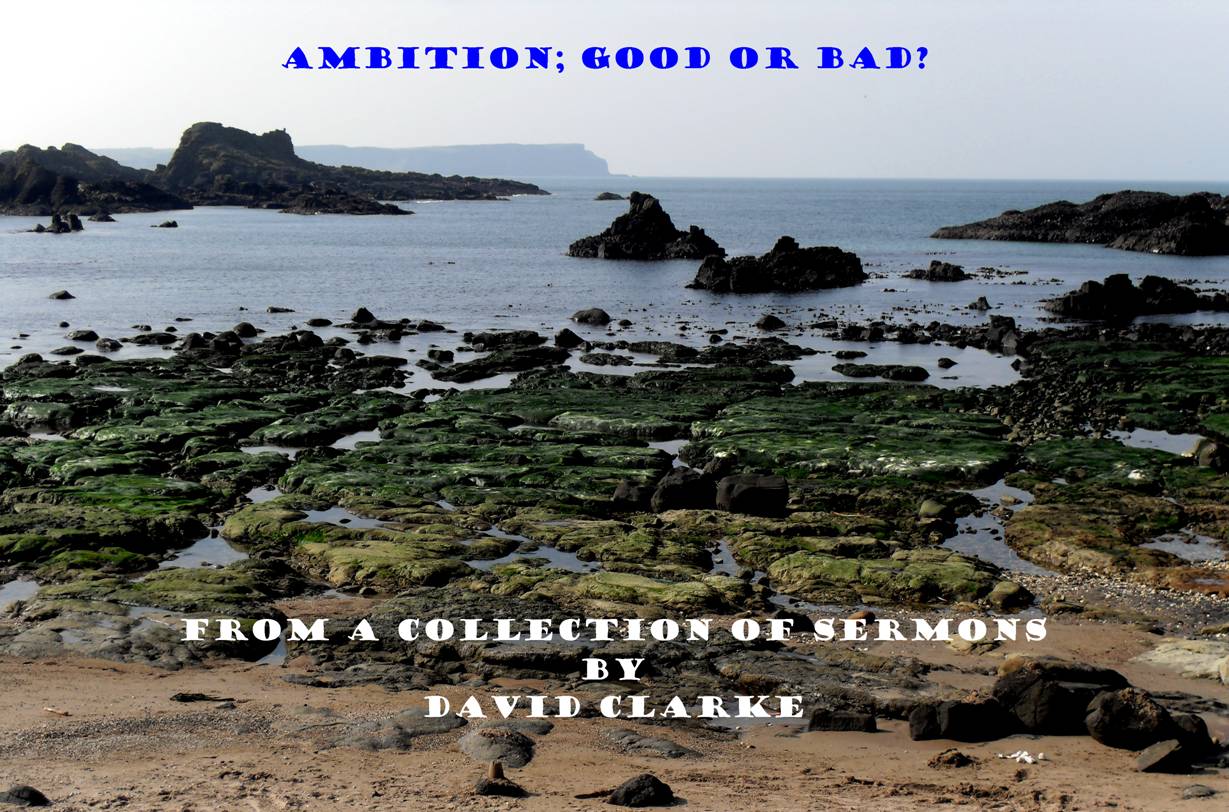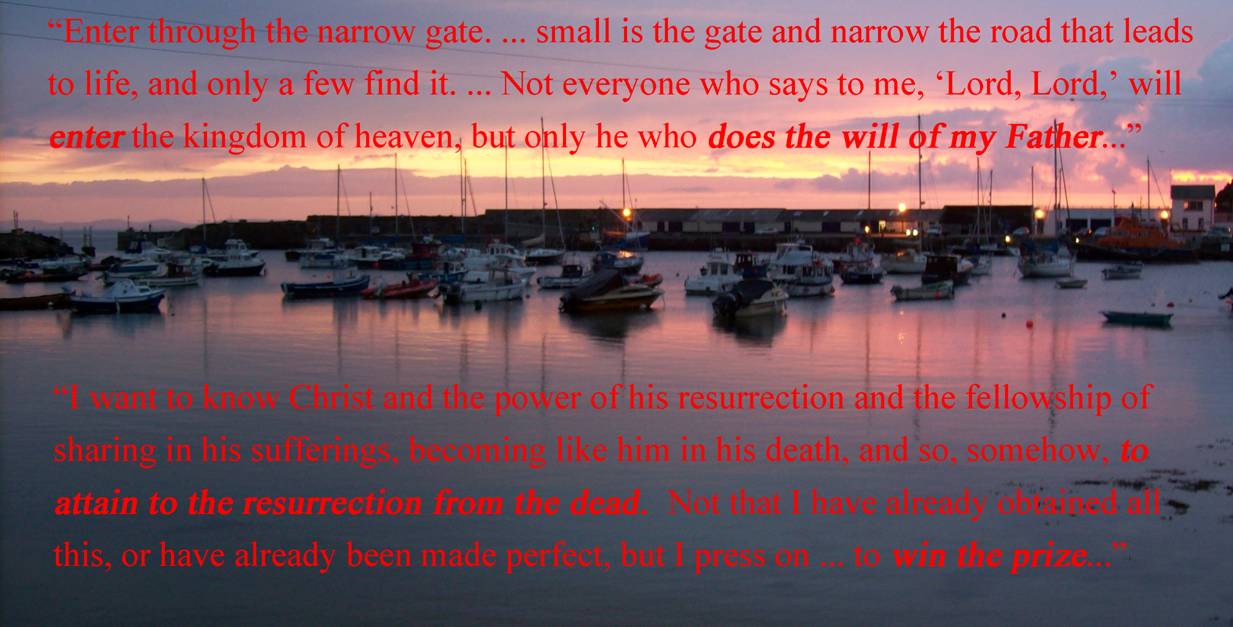
‘Should you then seek great things for yourself?
Seek them not’.
Jeremiah 45: 5
By this time next week, the Rugby
World Cup will have started in
The present world athletics championships in
The same drive is necessary for success in business. Lord
Sugar in The Apprentice tolerates
no slackness. Andrew Carnegie, the steel magnate once said, ‘Aim high. I would not
give a fig for the young man who does not already see himself the partner or
the head of an important firm. Do not
rest content for a moment in your thoughts as head clerk, or foreman, or
general manager in any concern, no matter how extensive. Say to yourself, “My
place is at the top!” ’
Against all that worldly wisdom, set the advice of the Bible,
and in particular this advice from Jeremiah
the prophet to his friend Baruch, ‘Should you
then seek great things for yourself? Seek them not’. The sentiment would have come as a shock to
Baruch! He came from a home where his
parents had great expectations. The name
they gave him, Baruch, means blessed, and no doubt, like many doting parents
they thought the sun rose and set on their little lad. His grandfather, Maaseaih, had served as Governor
of Jerusalem under King Josiah.
In the city, Baruch was regarded as influential. Indeed, some saw Jeremiah as an unwitting
tool in the hands of the subtle Baruch.
Thus positioned, in the confidence of the royal family, and with
influence in the city, Baruch must have entertained high ambitions. It was quite a rude awakening to discover
that his friendship with the prophet Jeremiah was bringing him into head-on
conflict with the ruthless King Jehoiakim. ‘No great things for
you, Baruch, my friend.’ Jeremiah was careful to warn him what lay ahead
for the both of them; how the authorities would try to arrest them (36: 26); how in speaking the word of God,
they would be accused of lying (43: 2); and
how they would face captivity and death (43: 6).
Now Jeremiah’s advice might be construed in a very narrow
fashion, simply telling Baruch that in this historical context it would be
wrong to place all his hopes on the stability of the monarchy, for it was
doomed to defeat. I think, however, it
carries a broader and abiding spiritual warning against overweening
ambition. ‘Should
you then seek great things for yourself? Seek them not.’
But something also lay ahead for Baruch that no one could have
predicted. He was the one who gathered together for posterity the
writings and messages of his friend Jeremiah. For that
ministry later generations have indeed called him ‘Blessed’.
Fame came for him, as it so often does, as a mere by-product, the result
of an unselfish act in support of a great ideal.
Ambition needs a better press
To
call someone ambitious carries with it a note of criticism, and for that we
probably have to blame William
Shakespeare. Almost every reference
to ambition in his plays suggests that ambition is dangerous and unworthy. Over the dead body of Caesar, Brutus remarks,
‘As he was ambitious, I slew him’. Elsewhere he talked about ‘vaulting ambition’, lamented the wars that made
ambition virtue, and encouraged men to ‘fling away
ambition’. Mind you, he was
ambitious himself. Peter Ackroyd, in a biography of
Shakespeare, observed that there is no record of Shakespeare ever having
praised another writer.
Christian preachers sometimes give the same impression. The passage we read in Mark’s gospel appears
to condemn ambition. But if you read it
carefully you will see that part of the reason that the colleagues of James and
John were incensed at the brothers coveting the top positions was that the
other disciples wanted those positions for themselves! And Jesus
did not dash their ambition. He
simply reminded them that every ambition
has a price, asking them, ‘Are you able to drink the cup of suffering I have
to drink?’
Ungoverned ambition, of course, has been the source of
boundless mischief. Much of human
history is stained with the sordid stories of men striving for power and
sweeping aside all considerations of morality in their rage for greatness and
control. But if that impulse is often
misdirected, it is still an intrinsic part of our nature. The great scholar, Bishop Westcott, said, ‘If by ambition
angels fell, by ambition men have risen’. Was it wrong for a dying mother to say to her
son, ‘Be somebody’? Was it wrong for the young John Milton to confess that he longed
to write something that the world would not willingly let die? Was it wrong for the young Charles Gounod to write to his mother
declaring that he wanted to be a musician, and when she rebuked him by saying
that a musician amounts to nothing in the world, to reply, ‘Is it nothing to be Mozart or Rossini?’ Were they wrong?
A proper view of our own worth underlines the appropriateness
of such ambition. We have been made in
the image of God, just a little lower than the angels, and we have been
redeemed by the blood of Christ. There
are talents and potentialities in our lives that ought to be developed, and
exploited, if we are to fulfil ourselves as God’s creatures. The film My Fair Lady is based on Bernard Shaw’s
play Pygmalion. A
professor of phonetics, Henry Higgins is teaching the Cockney girl, Eliza, how
to ‘speak proper’. After much exasperation, he bursts out, ‘You are English. Your
language is the language of Milton and Shakespeare, and you are standing there
cooing like a bilious pigeon’.
Within each one of us there are great potentialities. The counsel Dr. Jowett of Balliol in
Ambition
needs a better purpose
Baruch was feeling low when he realised that his fondest
dreams were impossible of fulfilment. He
was at odds with the king; the nation was on the brink of dissolution; his
hopes were irretrievably dashed. In that
situation God had two things to teach Baruch.
First, Baruch’s heartache was as nothing compared to the spiritual agony
in the heart of God. There is no sorrow
like unto His sorrow. Verse 4, ‘I will
overthrow what I have built, and uproot what I have planted’.
How it must have grieved God to see the downfall of the nation he had
cared for so laboriously over the years.
Second, Baruch had to learn to thrust self into the
background. In verse 3 in the Hebrew text the personal
pronoun occurs 5 times, but even the NIV conveys the self-centredness of it,
‘You said, Woe to me! The Lord has added
sorrow to my pain. I am worn out with
groaning and find no rest’. It is the
same obsession with self that the Pharisee expressed in his
The apostle Paul was an ambitious man, but
note the focus of his ambition.
There is a rare Greek verb (Philotimeomai) which he used to show the ambitions which
governed him. ‘We make it
our goal to please him’. (2 Corinthians 5: 9).
The cheers of the crowd, or the smiles of the powerful
meant nothing if he did not have the approval of the Man of Nazareth. The late Catholic Archbishop of
Paul revealed another of his governing ambitions when writing
to the Romans, ‘It has always been my ambition to preach the gospel where
Christ was not known’. (15: 20).
When David Livingstone was
interviewed by the London Missionary Society and was asked where he would like
to go, he replied, ‘Anywhere, so long as it is forward’. In the middle of the American Civil War, the
famous Confederate General known as Stonewall
Jackson, prayed this prayer, ‘0 God, settle this
cruel warfare, and send us back to our homes to our God-given purpose of
winning men to Jesus Christ’.
Paul expressed another of his controlling ambitions to the
Thessalonians, ‘Make it your ambition to lead a quiet life’. (1 Thessalonians 4: 11).
Excitement was at fever pitch in that city, for the
Christians there had downed tools and were standing around waiting for
the return of Jesus Christ. Paul
attempted to defuse the situation. Live
quietly. Let him find you doing your duty when he comes. Covet ‘the quiet
beauty of an ordered life’. The Scottish church
leader, Principal Robert Rainy of
New College, Edinburgh, who declared a teenage ambition to be ‘eminently spiritual’, wrote this, ‘Today I must lecture.
Tomorrow I must attend a committee meeting. On Sunday I must preach. Some day I must die. Well then, let us do as well as we can each thing as it comes to us’.
Paul’s writings abound with references to running and boxing
and even chariot racing. He noticed how
diligently athletes strived to win the
prize, in their case a crown of laurel leaves, which quickly withered.
Paul, on the other hand, was striving to win an unfading crown of righteousness.
Before every baseball match the individual members of a team
were required to enter a room alone, and stand before a wall on which was
written the slogan, ‘For
Should you then seek great things for
yourself? Seek them not. No, seek
them for God!
-------
